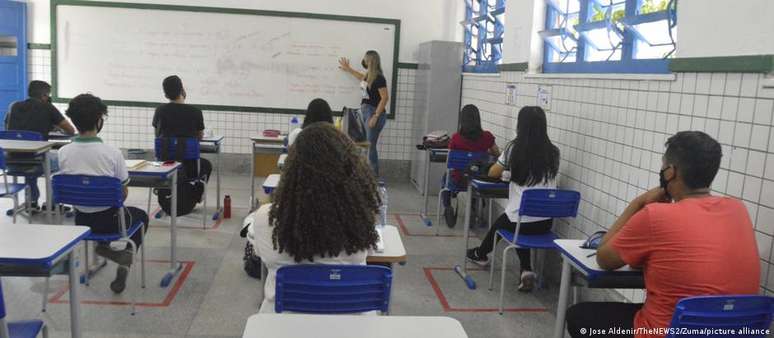It is possible to struggle to get the attention of the most agitated students. However, there is little that can be done to attract the interest of those who hate school: there is much talk about those students who cause confusion, who talk a lot and take a long time to concentrate in class. However, there is another profile, which is rarely talked about, which I believe is even more challenging: the apathetic student.
I have already visited hundreds of high school classrooms, in more than 100 schools in ten different states, and I can say with certainty: my greatest challenges have not been with groups of students who talk a lot, who are easily distracted and have difficulty to communicate. focus, but rather with classes made up entirely of apathetic students.
I am not alone in this perception. I spoke with several teachers who said they preferred “disorderly” students to apathetic ones.
It is natural to enter classrooms with more “agitated” students, who talk a lot, like to “make fun of each other” or who participate in conversation groups. Even as a student I was someone who really liked to talk and sometimes I needed to be pushed by the teachers. With groups like this there is still room to work. You can find ways and strategies to capture students’ attention and engage them with the exposed content.
Please don’t interpret this as a romanticization or naturalization of indiscipline. I agree that there are cases of disrespect that require attention and that cannot be naturalized, but the scenario I tried to paint was the average school classroom, in which absolute and continuous silence is so utopian that it is no longer effective to aim for him. Furthermore, it should not even be a coveted scenario, since the active participation of students must be valued.
Now, going in the opposite direction, it is incredibly more challenging to work with classes made up solely or primarily of apathetic students. Speaking coldly, the feeling is that there is no more “life”, “spark” or space to work with those students.
I remember one time I was speaking in a class. There were no problems with side conversations or clutter. Silence reigned, but my speech was still incredibly difficult and demanding. At one point, I looked at the class and simply none of the students were looking at me. Everyone looked at one point and no one looked at me. I felt so sad, it was like they didn’t want me there at all and I felt like I was bothering them the most.
This has already happened in other classes and it is always a huge challenge, but different from that of the “happy” classes. Let me explain: struggling to attract the attention of the class at the beginning, to alleviate a distraction during or to attract the attention of a student or a group who is actually damaging the presentation of the contents, are possible struggles to carry on .
Almost impossible fight
Now, how do you get someone to pay attention when they clearly hate being in that space and are so unmotivated that they no longer have the energy to frown? The more optimistic will say that there are ways to interest them and make them feel like they belong, and I agree. For many there is this margin for work and this possibility, but for others, unfortunately, I fear there is very little that can be done.
I speak in different classes and very punctually. I sympathize with teachers who simply work with classes like this all year long. It is a feeling of frustration, sadness, empathy and disappointment which, together, can significantly demotivate teaching work.
Imagine preparing yourself to do a good job, thinking of ways to innovate, constantly updating yourself to participate in a course where no one even looks at your face? And it’s not even because your lesson isn’t interesting, because they just didn’t give you a chance. It’s a very challenging situation.
Emotional disconnection from the school environment
In this final part of the text it is worth bringing the discussion back to: what makes a student like this? I have my theory and you, the reader, as always, are invited to think differently and bring other points of view.
I have a nephew who just doesn’t like school. He is in his second year of high school at a public school and, even though he has an uncle who is part of the educational environment, he simply sees no point in school. Of course in his case there is also laziness and addiction to games and cell phones, but we must also consider an ordeal: does the school talk to him? Does the environment make you feel like you belong?
Going beyond my nephew’s particular case, it is difficult to pinpoint a specific reason, but I believe the root lies in the total emotional disconnection with the school environment. For some, they’ve just been going for years. For others, specific issues, such as family problems, personal issues and difficulties in balancing work and study, keep them emotionally distant from school.
I believe the likelihood of success in saving these students is directly related to the length of time they have been disconnected from school. For example: cheering up a student who has been going to school for more than a year just for the sake of going to school is a huge challenge. This fact only reinforces how much teachers need help.
There is an urgent need for a capable multidisciplinary team in all public schools in Brazil. This team needs to rely especially on psychology professionals who could be important agents for the issues raised.
______________________________
Vozes da Educação is a fortnightly column written by young people from Safeguarda, a social volunteer program that helps Brazilian public school students enter university. The founder of the program, Vinícius De Andrade, and the students assisted by Safeguarda in all states of the federation take turns writing the texts. Follow the Salvaguarda profile on Instagram at @salvaguarda1
This text was written by Vinícius De Andrade and reflects the opinion of the author, not necessarily that of DW.
Source: Terra
Rose James is a Gossipify movie and series reviewer known for her in-depth analysis and unique perspective on the latest releases. With a background in film studies, she provides engaging and informative reviews, and keeps readers up to date with industry trends and emerging talents.







